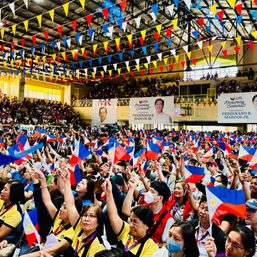SUMMARY
This is AI generated summarization, which may have errors. For context, always refer to the full article.

I am driving at three points:
- If national elections are influenced by the votes delivered by local machinery, then it is at the local level where citizens who want to make a difference should organize.
- If citizens are resigned to Congress’ lack of independence from Malacañang, then their chance of being truly represented, heard, and included in governance is in these self-determining localities.
- If installing leaders who are not from political families cannot be widely achieved, then working with our local governments could be more strategic than simply dismissing or avoiding engagement with them.
Organizing at the local level
One way to get involved in organizing locally is by joining local or regional political parties and organizations. Their potential for getting members elected has yet to be maximized.
In 2019, among the 3,267 who won as municipal mayors and vice mayors, 356 came from 23 local and regional parties, including Sara Duterte’s Hugpong ng Pagbabago.1 Among the 51 party-list organizations which won, at least 6 do region-focused work: Ako Bicol, An Waray, Ako Bisaya, Tingog Sinirangan, Kusug Tausug, and Anak Mindanao. Of the 134 that participated in the party-list election, 19 were local and regional parties and organizations.
Participation in local governance
The 1987 Constitution provides, in Section 9 of Article X, that “legislative bodies of local governments” – provincial boards, city councils, and municipal councils – “shall have sectoral representation as may be prescribed by law.” The Local Government Code of 1991, through Section 41, intended to enable that constitutional mandate, providing for 3 elected sectoral seats: one for the women, one for workers, and one for any of the following: urban poor, indigenous cultural communities, disabled persons, or any other sector determined by the board or council.
In 1994, however, in enacting Republic Act 7887, Congress said that yet another law was needed to implement the election of local sectoral representatives. Such law, which should provide for the manner of election of these representatives, has yet to be enacted to date – bills filed during the 15th, 16th, and 17th Congress did not progress.
Sections 34-36 of the LGC provide a way around this, however. Naga City made use of this in 1995, when its city council passed Ordinance No. 95-092. It provided for a mechanism through which accredited non-governmental and people’s organizations would form a People’s Council, whose members would, in turn, elect among themselves representatives to various local bodies.
There are also special local bodies that are required by laws to allot seats for sectoral representatives:
• Local prequalification bids and awards committees of barangays, municipalities, cities, and provinces should have two seats for NGOs that are represented in their respective development councils.2
• Local school boards of provinces, cities, municipalities include the president of Parents-Teachers Association federations, representative of teachers’ organizations, and representative of non-academic personnel of public schools.3
• Local health boards of provinces, cities, municipalities should have a representative from the private sector or non-governmental organizations involved in health services.4
• Local development councils of the barangays, municipalities, cities, and provinces should have representatives from NGOs operating in their areas. These representatives should be given at least 25% of the council seats.5
• Local peace and order councils should have 3 representatives from the private sector for each level: regional, provincial, and city or municipal.6
• People’s law enforcement boards in municipalities and cities should have 3 members chosen by the peace and order council “from among the respected members of the community known for their probity and integrity.” One of them should be a lawyer; if not, a college graduate or the principal of the central elementary school in the locality.7
Working with – and keeping watch over – local governments
Getting to sit in the local councils (when an enabling law is finally enacted) and representation in local special bodies are not the only ways NGOs, people’s organizations, and the private sector can become the local governments’ “active partners in the pursuit of local autonomy,” according to Administrative Order No. 270,8 which prescribes the implementing rules and regulations of the Local Government Code. Article 62, under Rule XIII, also lists the following plans, programs, projects, or activities where citizens’ representatives “shall be directly involved:”
• Delivery of basic services and facilities
• Joint ventures and cooperative programs or undertakings
• Financial and other forms of assistance
• Preferential treatment for organizations and cooperatives of marginal fishermen
• Preferential treatment for cooperatives development
• Financing, construction, maintenance, operation, and management of infrastructure projects
Through these avenues, representatives of various organizations can offer their expertise and knowledge to help local governments plan, implement, monitor, and improve policies and programs. The many aspects of governance also present concerned citizens with a wider range of opportunities for watchdogging – because engagement with local governments includes holding them to account.
What are at stake?
All this participation in local governance will facilitate the grassroots organizing of sectoral and non-governmental organizations, and at the same time establish them as partners whose voice the local officials would think twice about ignoring when making political decisions.
The stakes will be higher after the midterm elections under Duterte.
In the 2019 senatorial campaigns, opposition and independent candidates complained about how local officials refused to give them rally permits or even receive them during courtesy calls because they were afraid of earning the President’s ire.9 There was only at least one village reported where officials and residents voluntarily organized an Otso Diretso gathering in Argao, Cebu.
In future elections, well-established local organizations can do the same for alternative candidates. In the party list, as we have seen in the results, it was also the strong local chapters or allies that delivered the votes to sectoral organizations.
The prospect remains for the country shifting to a federal system of government, with the Department of the Interior and Local Government saying it would continue with its information drive. With the House having practically the same composition as the one that passed the proposed federal constitution in the last Congress, and with the Senate populated by more allies of President Duterte, the vote to pass the measure might be easily achievable – if they push it.
Inevitably, however, any draft federal constitution passed by the legislature will be submitted to the voters in a plebiscite. In conducting information drives and in supporting or frustrating a charter change vote, the machinery of local politicians, local parties, and local sectoral and people’s organizations will be crucial.
But whether or not the shift to federalism happens, there’s another important reason citizens and sectoral groups, strategically organized, should be involved or be watching their local governments. Starting in the 2019-2022 term, local governments are set to receive a much bigger share in internal reveue allotment (IRA). The Supreme Court ruled in July 2018 that the “just share” of LGUs should be taken from a wider tax base – “all national taxes” – instead of just the national internal revenue taxes, as has been the practice since 1992.
To give us an idea of how much bigger the amount will become, consider that for 2019 the IRA share of LGUs, based on the old, limited base, was P648.92 billion. The petitioner in the case, meanwhile, Batangas Governor Hermilando Mandanas, has estimated that if computations had been made according to the wider base of revenues, that amount should have had an additional P56 billion (the yearly average if you divide the supposed unreleased total amount of P1.5 trillion from 1992 to 2019). That would have been a total of P704.92 billion – an amount that can boost programs and services if utilized properly, but can be squandered by poor planning and corruption.
Based on the rules governing IRA computations, incumbent elected officials will start drafting budgets based on the increased IRA share in 2021, for utilization in 2022 – an election year. What can be a more compelling argument for getting involved and organized at the local level?
1 Rappler database
2 Section 37, Local Government Code of 1991.
3 Section 98, Local Government Code of 1991.
4 Section 102, Local Government Code of 1991.e
5 Section 107, Local Government Code of 1991.
6 Executive Order No. 309, as cited in Section 116 of the Local Government Code of 1991.
7 Section 43, Republic Act 6975 or the Department of the Interior and Local Government Act of 1990.
8 Approved on February 21, 1992.
9 Aika Rey, “Afraid of Duterte, local leaders refuse to host Otso Diretso bets – Gutoc,” Rappler, April 27, 2019, updated April 28, 2019, https://www.rappler.com/nation/politics/elections/2019/229146-gutoc-says-local-leaders-refuse-host-otso-diretso-because-of-duterte; and Rey, “Poe says some local leaders refuse to host her too,” Rappler, April 30, 2019, updated May 1, 2019, https://www.rappler.com/nation/politics/elections/2019/229330-poe-says-some-local-leaders-refuse-host-her-too.
Add a comment
How does this make you feel?



![[New School] Tama na kayo](https://www.rappler.com/tachyon/2024/02/new-school-tama-na-kayo-feb-6-2024.jpg?resize=257%2C257&crop=290px%2C0px%2C720px%2C720px)
![[Only IN Hollywood] After a thousand cuts, and so it begins for Ramona Diaz and Maria Ressa](https://www.rappler.com/tachyon/2024/02/Leni-18.jpg?resize=257%2C257&crop=262px%2C0px%2C720px%2C720px)

![[EDITORIAL] Ang low-intensity warfare ni Marcos kung saan attack dog na ang First Lady](https://www.rappler.com/tachyon/2024/04/animated-liza-marcos-sara-duterte-feud-carousel.jpg?resize=257%2C257&crop=294px%2C0px%2C720px%2C720px)
![[Free to disagree] How to be a cult leader or a demagogue president](https://www.rappler.com/tachyon/2024/04/TL-free-to-disagree.jpg?resize=257%2C257&crop_strategy=attention)
![[OPINION] Can Marcos survive a voters’ revolt in 2025?](https://www.rappler.com/tachyon/2024/04/tl-voters-revolt-04042024.jpg?resize=257%2C257&crop=251px%2C0px%2C720px%2C720px)
![[Edgewise] Quo vadis, Quiboloy?](https://www.rappler.com/tachyon/2024/03/quo-vadis-quiboloy-march-21-2024.jpg?resize=257%2C257&crop_strategy=attention)
There are no comments yet. Add your comment to start the conversation.